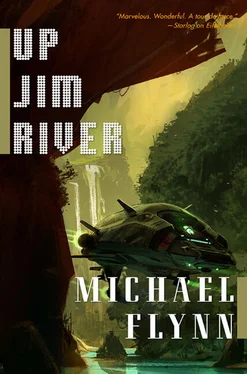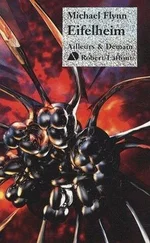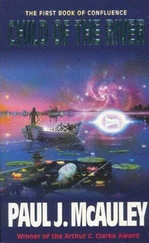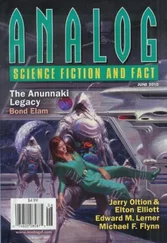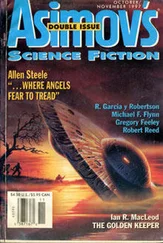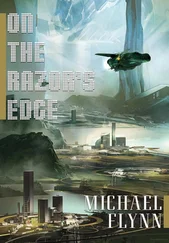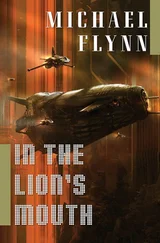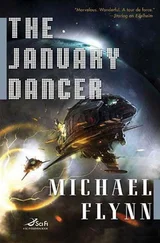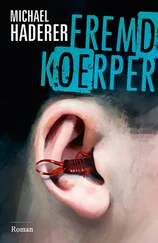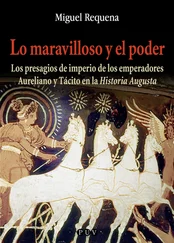The Fudir did not answer for a while. What a god-awful haystack, he thought, in which to lose a single needle. Ah, Bridget ban. Franane .
She must have been beautiful said the Silky Voice, not unkindly.
No, not beautiful; not in any conventional sense. But she had an inner light.
“And you were a moth to her flame,” whispered Donovan. What happened to the “witch” whose spell you “barely escaped”?
The Fudir made no answer. Turning to Méarana, he said, “No. I don’t think we ever will. I never did.”
Hot tears flowed down the harper’s face. She struck the Fudir repeatedly on the chest with both fists. “Then why, why, why did you come on this useless expedition?”
He took her by the wrists and stilled her punches; and she pressed herself against him and wept. “Maybe,” he said, “I was looking for something else.”
That night, Méarana sat at the desk in her bedroom reading Customs of the’ Loon Tribes of Cliff na Mac Rebbe hoping to find in its turgid pages some hint of why her mother had read it. But so far its only effect was to induce periodic slumber. The author’s primary conclusion seemed to be that’ Loon customs were unlike any elsewhere in the Periphery; but surely that could be said of the customs of most any people. She sighed, pinched the bridge of her nose, and closed the screen.
The room darkned with the screen. What did it matter, anyway? She had broken poor Donovan’s health, and all for what? What sort of Hell was it when love was alive and hope was dead? Maybe that was what Hell was: the graveyard of hope.
But the quest had not been entirely in vain! They had discovered some things that the Kennel had overlooked: That Mother had met Sofwari on Thistlewaite; that Sofwari had told her something that sent her back to Dangchao to spend most of two weeks behind the doors of her study. They had learned that she was searching for the source of the medallion, and that she had traveled as Lady Melisonde. All told, that was not much; but it was not nothing.
Greystroke and Hugh knew of these things now, and perhaps now the Kennel would resume the search—and have better luck in it than she could hope to have.
Perhaps it was time to think of herself. That was all Mother ever thought of.
It is the nature of man to be selfish, Mother had said. (And Méarana remembered a much younger self sitting by Bridget ban’s knee before a great fierce fire in Clanthompson Hall, while certain wounds of her mother healed.) It is a weakness passed down from our uttermost ancestors, the original sin from which all others arise. It emanates from the ancient brain stem and spreads by electrical synapses to the cortex, establishing by repetition its debilitating pattern .
The more these patterns of self-indulgence dominate, her mother had cautioned her, the less your capacity for reason. The brain stem is not in the final analysis a thoughtful companion .
But her mother rejected predestination. Whether the curse is carried in the genes, as the Calvinist prophet Dawkins had claimed, or whether it involves apples and serpents, as still older allegories run, a man can school his soul to a “second nature” and so overcome the curse. By diligent exercise, he can establish habits of thought that temper or block these signals with neural patterns of their own. With prudence, justice, moderation. And courage .
And Bridget ban had displayed to her awestuck daughter images from the emorái machine of her very soul: the sparking footprints of thought running through her mind .
There were too few such moments in her memory, though each one burned there with a certain intensity, as if like diamonds they compensated with their brilliance for their rarity. She had found herself when young wishing that her mother would be hurt again, forced thereby to convalesce at home. A minor wound—a child is none too clear on such matters—one that did not truly hurt. Had that not been a kind of selfishness?
Mother?
Yes, Lucy?
Who was my father?
Oh, he was a brave man, a clever man. We had a great adventure one time, he and I and some others .
Perhaps she had shown courage enough in pushing the quest this far. Perhaps it was time to show prudence, and give the whole thing up.
But what, then, of justice?
She grew aware of a soft tapping at her door and thought it might have been ongoing for some time. Rising abruptly from the desk, she went to the door and threw it open.
It was Billy Chins. He held a message packet in his hand and had his data ‘face tucked under one arm.
“It’s late, Billy,” she said and started to close the door.
“Please, missy,” he said, thrusting his hand out. “This come when you and sahb on Starwalk. This tok address him you, from home. I forget till now, but now I think, maybe mama come home and this tell you so?”
Méarana did not believe that, but stranger things have happened and she snatched the message from his hand in a spasm of hope and broke the seal. Billy watched with half an eye while he set his reader screen on her desk and woke it.
The message was from Hang Tenbottles and it contained only the unabridged edition of Commonwealth Days that her mother had read. It had been peeled off the master copy at the Archives at Sannaklar on Friesing’s World. Weirdly disappointed—she had had no right to expect anything more—she tossed it to her desk. “And what are you doing, boy?” she snapped. Billy had had no cause to raise her hopes even so unwittingly as he had.
He was setting up his’ face as a holo stage. “Oh, please, Mistress Harp. Sahb Donovan, he larim—I mean, he ‘give up.’Ammasmarpaña krana. He is kaput! No more help you find mama-meri. So he no laikim tru for see this. I show you, even if he beat me for such.”
He had activated the stage and a holo image now hovered above it. Méarana crossed over and studied it.
“What is it, Billy?”
“Is dibby from Sofwari left by Harpaloon. Make no meaning, alla code numbers. But Billy smart. He have second dibby, come from Dancing Vrouw, and I think, Billy, I say, why not run matchim up? So I find him the Vrouw data in the Harpaloon dibby.” He beamed.
Méarana sighed with exasperation. ‘I’m sure the dibby Sofwari left on Harpaloon included the data he had already harvested on Bangtop and Dancing Vrouw.”
Billy’s head bounced enthusiastically. “And Thistlewaite. Even earlier files from other places. But, missy, tissue bank on Vrouw, she no use code numbers , so I translate some of dibby. Find code numbers mean for birth-worlds, for people-groups, and so. Then put those into data columns for Bangtop and Thistlewaite and find more by the crossing of references. Then I do same with Bangtop data from Rinty. Is Sofwari find thirty-two people-groups!”
“I’m sure that is very interesting, but…”
“So I make map by birth-worlds of different groups. Also other maps, time plots, frequency plots, correlation plots, and so cetera. Billy hard worker. But they tell no nothing. See here.”
Méarana saw that the holo was a map of the Periphery. One corner of the map bore a legend:
Group 1:
Clanmother: Anandi
Origin: ca. 2000 years bp
Central Locus: Megranome
In the holomap, Megranome glowed bright red. Abyalon, Old’ Saken, and several worlds in the Cynthia Cluster were orange; Die Bold and Friesing’s World, yellowish; and Venishànghai and scattered other worlds were blue.
“What means it, Lady Harp?” Billy implored. “Billy, he make sense of data, but not make sense of sense.”
Méarana laughed at his syntax, but then reflected that the tangle had gotten it straight. The dibby meant the map; but what did the map mean? She flicked through some of the other groups: Kadrina, Khyaddy, Geeda…All female names, alphabetically ordered not according to Gaelactic but according to customary usages on some of the Old Planets. Most showed a “central locus” within the Old Planets shading off to other worlds. A few bore the note “Origin Before Cleansing.”
Читать дальше
